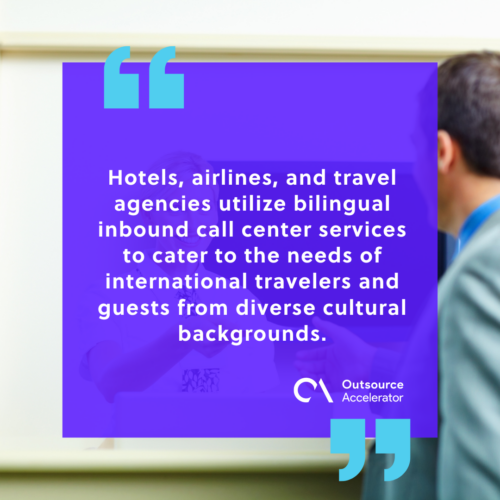Understanding bilingual inbound call center services

The ability to communicate with customers in their preferred language effectively is no longer a luxury but a necessity for businesses striving to be competitive.
While English is still the preferred choice for most call centers, there’s no denying that there is still a huge market for bilingual inbound call center services.
By providing services in multiple languages, your business can ensure effective communication with customers from different linguistic backgrounds. This offers a pathway to enhanced customer satisfaction, expanded market reach, and streamlined operations.
This article will examine the advantages of having bilingual inbound call center services. We’ll also offer some tips on how and why you should prioritize language diversity in your customer support operations.
What are bilingual inbound call center services?
Bilingual inbound call center services refer to customer support operations and assistance in multiple languages. Since inbound, agents typically handle incoming calls through telephone communication channels.
These services are often offered by call centers or customer service centers with a team of bilingual agents. They can cater to the needs of customers who prefer to communicate in a language other than the dominant one of the business or region.
Bilingual inbound call center services ensure that a greater number of customers receive assistance and support.

Examples of bilingual inbound call center services
Examples of bilingual inbound call center services can be found across various industries, each tailored to meet the specific needs and preferences of their diverse customer bases.
Here are a few examples:
Telecommunications
Many telecommunications companies operate bilingual inbound call centers to support customers who speak languages other than the primary language of the region.
These call centers assist customers with inquiries related to:
- Billing
- Technical support
- Account management
- Service activations
Financial services
Banks, credit unions, and financial institutions often offer bilingual inbound call center services to accommodate customers.
People may require assistance with:
- Banking transactions
- Loan applications
- Account inquiries
- Financial advice in other languages
Healthcare
Healthcare providers and insurance companies maintain bilingual call centers to support patients and policyholders who speak different languages.
Connext is among the top-tier offshore contact centers that assist with:
- Scheduling appointments
- Explaining medical procedures
- Clarifying insurance coverage
- Addressing healthcare concerns
Hospitality and travel
Hotels, airlines, and travel agencies utilize bilingual inbound call center services to cater to the needs of international travelers and guests from diverse cultural backgrounds.
These call centers handle:
- Reservations
- Bookings
- Itinerary changes
- Customer inquiries

E-commerce and retail
Online retailers and e-commerce platforms also provide bilingual customer support. Bilingual call centers assist with order inquiries, product information, returns, and customer assistance in languages other than the default language of the website.
Technology and software
Technology companies offering products and services maintain bilingual support centers to assist customers with technical issues, software troubleshooting, product inquiries, and software installations.
Best practices for bilingual inbound call center services
Here are some best practices for those handling bilingual inbound call center:
Provide comprehensive training
Firstly, it’s crucial to hire agents who are fluent in both of the languages required for your bilingual call center. But even with skilled agents, it’s important to cover all bases by making sure they are properly trained to your standards.
Offer thorough training programs that focus on language proficiency and customer service skills. This helps agents develop the necessary language and soft skills to handle interactions with customers from different cultural backgrounds.
Ensure language parity
Conduct thorough assessments to determine the language needs of your customer base.
Once you’ve ensured that your agents are proficient, maintain a balanced distribution of calls. This guarantees fair workloads and prevents agent burnout.
Offer language preferences
Allow customers to select their language preference at the beginning of the call. This way, they can connect with an agent who can communicate effectively in their preferred language.
You may opt to use language-specific scripts for your bilingual inbound call center services.
Implement quality assurance measures
Implement extensive quality monitoring processes to evaluate agent performance in bilingual interactions. Regularly monitor them to ensure adherence to established quality standards.
You should also assess language proficiency, professionalism, and customer satisfaction levels.
Utilize language tools and resources
Equip agents with language resources such as translation and interpretation tools, glossaries, and FAQs in both languages. These resources can enhance their ability to communicate with customers and provide accurate information effectively.
Promote cross-cultural understanding
Cultural sensitivity is very important when it comes to bilingual inbound call center services.
Foster a culture of diversity and inclusivity within the call center. Aside from providing training programs, you can also encourage agents to share their cultural knowledge and experiences.
This promotes understanding and empathy among team members and facilitates respectful interactions with callers from diverse backgrounds.
Continuously improve
Provide opportunities for your agents to enhance and develop their skill sets. Keep updated on best practices and industry trends so that you stay competitive and deliver the best possible service to your callers.
Advantages of bilingual inbound call center services
Some of the key benefits of bilingual inbound call center services include:
Expanded market reach
Bilingual inbound call center services allow businesses to e
This strategy helps you to tap into new markets and increase revenue potential.
Enhanced customer satisfaction
By offering support in the customer’s preferred language, businesses can deliver a more personalized and satisfactory experience.
Customers feel understood and valued, resulting in increased customer satisfaction and loyalty.
Improved communication
Bilingual call centers minimize or even outright eliminate language barriers, allowing for smooth and clear communication between agents and customers.
This, in turn, results in a better understanding of inquiries, quicker issue resolution, and improved overall customer service experience.
Competitive advantage
Businesses that offer bilingual support gain a competitive edge over those that may only provide support in a single language. It showcases a commitment to inclusivity and customer-centricity, allowing companies to attract and retain a wider range of customers.
Reputation enhancement
Providing exemplary bilingual customer service enhances a company’s reputation and brand image. This can lead to positive word-of-mouth referrals and favorable online reviews, further strengthening the brand image.
Bilingual inbound call center services offered by Booth and Parners let firms can provide effective language diversity solutions, fostering seamless communication that leads to exceptional customer experiences.







 Independent
Independent




